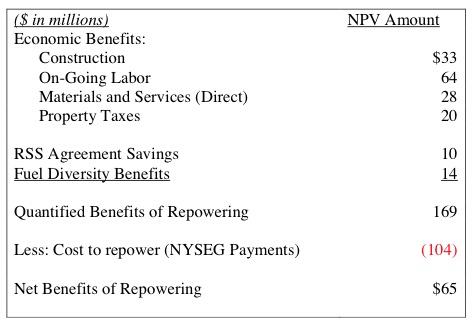- By Dan Veaner
- News
 Print
Print  The February 6 deadline has passed, and Cayuga Operating Company (COC) and New York State Electric & Gas (NYSEG) have submitted their proposals to the New York State Public Service Commission (PSC). It is now up to Albany to decide whether Lansing's Cayuga Power Plant will remain open or shut its doors forever.
The February 6 deadline has passed, and Cayuga Operating Company (COC) and New York State Electric & Gas (NYSEG) have submitted their proposals to the New York State Public Service Commission (PSC). It is now up to Albany to decide whether Lansing's Cayuga Power Plant will remain open or shut its doors forever.Since the issue was first raised power plant officials have been given seven extensions to come up with a plan the PSC might accept. For much of the past year they were expected to come up with a joint plan with NYSEG, but those negotiations fell apart at the end of last year. Plant officials requested a new extension to develop their own plan, and were given until last Friday to come up with it.
The COC plan is similar to one of its original plan. It would repower the Lansing coal-fired plant with natural gas, requiring a gas line to be extended from Freeville through Dryden and Lansing to the lakeside facility. COC includes a long list of benefits to electric customers and the Lansing school district and community in general.
"The Revised Repowering Proposal recommends that New York State Electric & Gas Corporation (“NYSEG”) pay $49.5 million in order to fund construction costs and $9.6 million per year for 10 years ($104.2 million net present value [“NPV”]) to Cayuga to (1) add gas-fired capability to the 2 electric generating units at the Cayuga Facility, and (2) operate these units for 10 years commencing approximately January 1, 2017," says the COC plan.
 Cayuga Operating Company summarizes financial benefits and savings of repowering the Cayuga Facility in this chart, claiming a total of $65 million in benefits.
Cayuga Operating Company summarizes financial benefits and savings of repowering the Cayuga Facility in this chart, claiming a total of $65 million in benefits.NYSEG says they negotiated in good faith, but were unable to come up with a plan agreeable to both parties. These days NYSEG is a power transmission company, while the plant, obviously, creates electricity to be transmitted. Theoretically the region needs both to fulfill NYSEG customer needs, but NYSEG has taken the stance that they can get the power elsewhere.
"Despite lengthy good faith negotiations, NYSEG and Cayuga Operating Company, LLC have been unable to agree upon a revised repowering proposal that meets the Commission’s requirements, including 'at the least cost to ratepayers,' set forth in the Notice," says the NYSEG response to the COC plan. "NYSEG cannot agree with Cayuga’s repowering proposal because it would require NYSEG customers to finance the repowering of Cayuga Unit 1 and Cayuga Unit 2 at a cost that is millions of dollars more expensive for customers than other available options."
NYSEG concludes that keeping the plant open will be more costly to ratepayers than their own transmission system upgrade plan
"NYSEG has estimated market revenues from sales by a repowered Cayuga Facility of $263.7 million on a NPV basis, resulting in a net cost to customers of $188.6 million for repowering," the company argues. "Even in a conservative analysis where Cayuga Facility repowering is credited for potential indirect benefits associated with early termination of the existing Reliability Support Services Agreement (“RSSA”)9 and uncertain local economic benefits, the cost disadvantage to customers for the repowering option remains $160.7 million."
Plant officials say that NYSEG can not reliably supply Auburn with the electricity it needs if the plant is closed.
"Without either of the Cayuga generators operating and absent the transmission reinforcements, for approximately 500 hours of each year, NYSEG’s Auburn area customers would be exposed to extended outages," the COC proposal states.
After nearly two years of debate, a decision could come from the PSC and Governor Cuomo any day now.
v11i7



